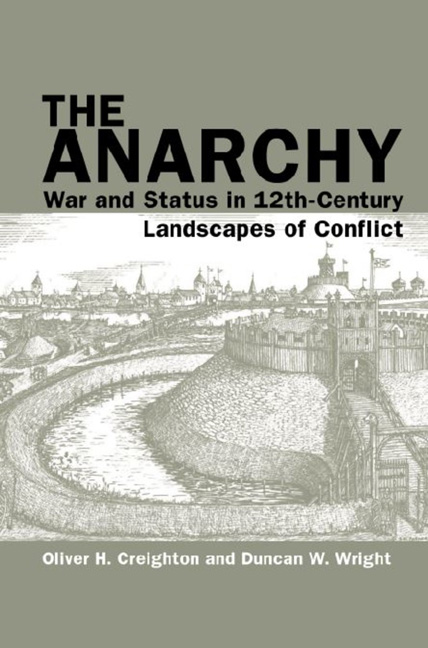Book contents
- Frontmatter
- Contents
- Acknowledgements
- List of Figures
- List of Colour Plates
- Chapter 1 Introduction
- Chapter 2 Historical Outline and the Geography of ‘Anarchy’
- Chapter 3 Waging War: Fields of Conflict and Siege Warfare
- Chapter 4 Architecture and Authority: Castles
- Chapter 5 Material Culture: From Arts to Coins
- Chapter 6 Performing Violence: Arms, Armour and Military Apparel
- Chapter 7 Faith and Fortification: The Church
- Chapter 8 Town, Village and Country
- Chapter 9 Anarchy on the Fen Edge: Case Study of the Isle of Ely
- Chapter 10 The Twelfth-Century Civil War in Context: Assessment and Reassessment
- Appendix Key Sites to Visit
- Bibliography
- Index
- Plate section
Chapter 9 - Anarchy on the Fen Edge: Case Study of the Isle of Ely
- Frontmatter
- Contents
- Acknowledgements
- List of Figures
- List of Colour Plates
- Chapter 1 Introduction
- Chapter 2 Historical Outline and the Geography of ‘Anarchy’
- Chapter 3 Waging War: Fields of Conflict and Siege Warfare
- Chapter 4 Architecture and Authority: Castles
- Chapter 5 Material Culture: From Arts to Coins
- Chapter 6 Performing Violence: Arms, Armour and Military Apparel
- Chapter 7 Faith and Fortification: The Church
- Chapter 8 Town, Village and Country
- Chapter 9 Anarchy on the Fen Edge: Case Study of the Isle of Ely
- Chapter 10 The Twelfth-Century Civil War in Context: Assessment and Reassessment
- Appendix Key Sites to Visit
- Bibliography
- Index
- Plate section
Summary
IN A PERIOD with more than its fair share of infamous characters, Geoffrey II de Mandeville, Earl of Essex from 1140, is perhaps the most disreputable of all. In J.H. Round#x0027;s 1892 biography Geoffrey de Mandeville, the earl was ‘the great champion of anarchy,’ the quintessential robber baron whose allegiance shifted as he sold and resold himself to the highest bidder. Authors since have been tempted into portraying him as ‘the poster boy of England's “anarchy.”’ Historians have unsurprisingly focused on Geoffrey's remarkable political career; debate has centred on the extent of his loyalty, his motives and the reasons for his downfall, the evidence hinging on charters whose dating has been vigorously contested. Rather less attention has focused on the realities on the ground of Geoffrey's military involvement in the civil war – most notably, his rebellion and fenland campaign of 1143–44 that ended with his death, and a programme of castle building and aggrandisement that mirrored his meteoric rise – and its impact upon the landscape. Accordingly, this case study considers the conflict landscape of the Isle of Ely and its surrounding district, which was the focus not only of Geoffrey de Mandeville's revolt but also two earlier operations, by King Stephen in 1140 and by Geoffrey and Earl Gilbert of Pembroke in 1142. Three campaigns in four years ensured that the fenland region was one of the most heavily affected in the entire civil war. The Anglo-Saxon Chronicle's generalised description of Stephen's reign as 19 winters ‘when Christ and his saints slept’ – perhaps the most oft-quoted snippet of primary documentary evidence for the chaos of the civil war – was written by a Peterborough monk and may well draw on local experiences of the conflict rather than capturing the situation in England more generally.
This case study presents a narrative account of the three fenland campaigns of the 1140s against the background of William I's famous struggle in the same area against Hereward the Wake in 1070–71. It reconstructs the main military movements and events as a basis for examining the archaeological evidence for the network of castles that loomed large in and around this unusually complex conflict landscape.
- Type
- Chapter
- Information
- The AnarchyWar and Status in 12th-Century Landscapes of Conflict, pp. 251 - 278Publisher: Liverpool University PressPrint publication year: 2017



